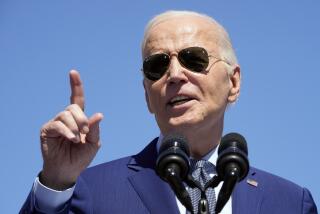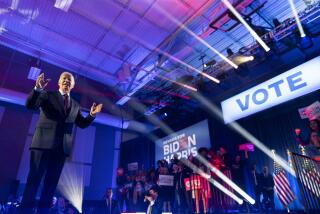Obama by the numbers
President Obama didn’t get much time last week to savor the gauzy one-year-after retrospectives of his 2008 election victory, with its 53% of the popular vote and 365 electoral votes. He had other numbers to think about.
On Friday, the Labor Department announced that unemployment hit a 26-year high of 10.2% last month. Earlier last week, in Virginia and New Jersey -- states that were Obama’s last year -- Republicans won gubernatorial seats by margins of about 17% and 5%, respectively. And the president’s own approval rating, a dizzying 78% when he was inaugurated, has fallen to a prosaic 50%.
State and local elections often turn on local circumstances, and there were plenty of those to muddy the message from Tuesday’s election. But there’s nothing complicated about the mood in the rest of the nation. Voters in 50 states are unhappy about the economy, angry about partisanship in Washington and disappointed in Obama’s failure to live up to their inflated expectations.
For Democrats, the unemployment number was the week’s most alarming. It now becomes the Republicans’ chief argument that Obama’s policies have failed -- never mind that their own alternative, a smaller economic stimulus, would have done no better.
“Tell me what the unemployment rate is in 2010 and I’ll tell you how that election turns out,” Republican strategist David Winston said. “When unemployment hits a certain level, it’s the only domestic issue that matters.”
In the first months of his presidency, Winston noted, Obama focused like a laser on the economy, and his approval ratings were high. But during the last six months, his agenda has been more fragmented as he’s tackled healthcare, climate change and Afghanistan.
Some White House aides say that there’s nothing here that a couple of million new jobs won’t fix. But Obama didn’t run for president only to fix the economy. Candidate Obama’s promise was to move American politics beyond its normal limits.
On that count, two more numbers should give the president pause. When the Gallup Poll asked voters last month if Obama had kept “the promises he made during his presidential campaign,” only 48% said yes. And when the pollsters asked whether voters considered Obama a liberal or a moderate, 54% called him a liberal -- a big jump from the 43% who gave that answer on election day in 2008.
Many of those disillusioned voters are moderates and independents, people who voted for Obama not because they supported liberal programs but because they responded to his call for a post-partisan politics. To be sure, Republicans in Congress haven’t given Obama many chances to pass bipartisan legislation; they have opted instead for drawing sharp contrasts. At least in the short run, that strategy appears to be working.
Instead of a new centrist consensus, Obama’s first year has produced a backlash -- and not only among zealots of the Republican right. Polls show conservative views up across the entire electorate.
On election day last week, those trends were reflected in an “intensity gap” that brought Republican voters to the polls -- the inverse of the 2008 intensity gap that brought young voters and African Americans out for Obama. In Virginia, most of last week’s voters said they voted for John McCain in 2008; Obama voters stayed home.
What’s all this mean for the next 12 months? In the debate over healthcare, it means moderate Democrats from swing districts -- “Blue Dogs” who give Obama his majority -- will be even more skittish. They are demanding a bill without a hint of federal funding for abortions, and they are likely to get it -- just as Obama’s lone GOP partner on healthcare, Sen. Olympia Snowe of Maine, may get her wish for a bill without a “public option.”
Obama also needs to reassure voters in the coming weeks that he hasn’t forgotten about jobs. Expect to hear the president talk up not only the original stimulus plan -- whose effects have been real but disappointing -- but also new measures that add up to a stealth “second stimulus” package: last week’s extension of unemployment benefits, the expansion of home buyers’ tax credits and a $250 bonus for Social Security recipients.
In recent weeks, Obama and his aides have abandoned any pretense of post-partisanship; they have responded to every attack and even waged a brief jihad against Fox News. Their explanation was that conservative attacks on healthcare proposals required an energetic response. But their fury has damaged Obama’s image as a post-partisan centrist.
Not every number is as bad as it looks, though. Obama’s approval rating of 50% is almost exactly where Ronald Reagan’s was at this point in his presidency in 1981; it’s higher than Bill Clinton’s was in 1993.
“When things aren’t going well in the economy, you can’t expect people to say they approve,” said Andrew Kohut of the Pew Research Center. “But he’s managed to maintain the public’s confidence. ... People like him.”
Last week’s numbers just mean that American politics have returned to normal. That doesn’t mean Obama’s presidency has failed; far from it. But it does mean his ambitions, which once seemed limitless, will now be trimmed.
--
More to Read
Get the L.A. Times Politics newsletter
Deeply reported insights into legislation, politics and policy from Sacramento, Washington and beyond. In your inbox three times per week.
You may occasionally receive promotional content from the Los Angeles Times.











